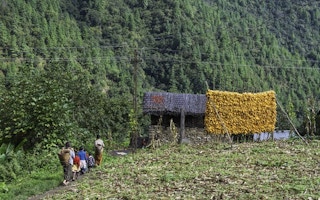India is embarking on a national campaign to help millions of indigenous people protect their forest land and resources using a seven-year-old landmark law that has gone largely ignored, the country’s tribal affairs minister said on Monday.
The Forest Rights Act of 2008 was hailed by campaigners as a watershed law that would improve the lives of impoverished tribes by recognising their right to inhabit and live off the forests where their forefathers settled centuries before.
But India’s Tribal Affairs Minister Jual Oram admitted the law remains poorly implemented, leaving some forest dwellers open to abuse, exploitation and eviction, with Prime Minister Narendra Modi calling for action to protect their livelihoods.
“Although a large number of forest dwellers know about the Forest Rights Act, we still need to create awareness so that everybody knows about it and benefits from it,” Oram told the Thomson Reuters Foundation in an interview.
Oram said recent progress in technology will make it easier to identify the land claimed by forest dwellers, many of whom live on the margins of society and are dependent on the land for their food security.
“
Our country is very big, knowledge of people living in interior forested areas is limited and the state bureaucracy, which is responsible for raising awareness, is very slow.
Jual Oram, Tribal Affairs Minister
“…With the adoption of new technology such as Google maps to demarcate areas, settling claims could be much faster,” he said.
While the law was passed by the federal government, many of the country’s 36 states and territories, which are responsible for its implementation and enforcement, had failed to do so, Oram said.
“Our country is very big, knowledge of people living in interior forested areas is limited and the state bureaucracy, which is responsible for raising awareness, is very slow. These are the main problems why it is not implemented,” he said.
Directives have been sent to the states to enforce the law and the central government is organising workshops and seminars with local officials and human rights groups to promote awareness of the Forest Rights Act, he said.
According to a July study by the Washington-based Rights and Resources Initiative (RRI), the Forest Rights Act has the potential to give an estimated 150 million people rights over at least 40 million hectares (100 million acres) of forested land.
If properly implemented, the study said, the law would shift forest governance from “an undemocratic, colonial system to a decentralised, democratic one” where local village councils are the main decision-makers over the forest land and produce.
Rights over resources
Inhabiting remote areas, the way of life of many tribes and other forest dwellers has barely changed over the centuries, with communities eking out a living from farming, cattle rearing and collecting fruit and leaves.
Few have benefitted from the India’s economic boom over the last two decades, partly due to a Maoist insurgency in the country’s central belt and partly due to general neglect by authorities. As a result, social indicators such as child malnutrition and literacy are among the worst in the country.
But activists say the biggest threat to these communities is the risk of losing their land and livelihoods.
A lack of documents proving ownership of the land means that they can be exploited by wealthy land owners and money lenders, moved off their farms in illegal land grabs or face extortion by forestry officials.
Oram said that challenges were not just about ensuring people understood their rights, but also how to ease the processing of claims over land and minor forest produce which has been difficult due to the mapping and delineating of areas.
“Our ministry has directed different state governments to implement it,” said Oram.










